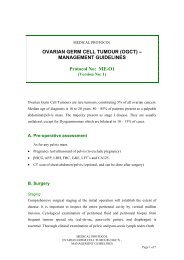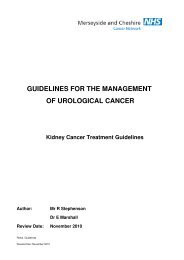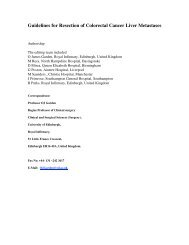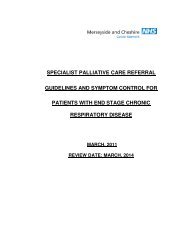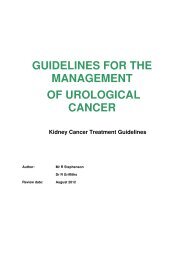Cancer Reform Strategy - NHS Cancer Screening Programmes
Cancer Reform Strategy - NHS Cancer Screening Programmes
Cancer Reform Strategy - NHS Cancer Screening Programmes
- No tags were found...
You also want an ePaper? Increase the reach of your titles
YUMPU automatically turns print PDFs into web optimized ePapers that Google loves.
98 CANCER REFORM STRATEGY7.26 In the year leading up to the <strong>Cancer</strong><strong>Reform</strong> <strong>Strategy</strong>, the <strong>Cancer</strong> ServicesCollaborative Improvement Partnership, <strong>Cancer</strong>Action Team and the <strong>NHS</strong> Institute haveconducted a number of studies and pilotslooking at ways to improve inpatient care andthis work has identified huge potential toimprove the quality and productivity ofinpatient care for cancer and reduceunnecessary hospital use.7.27 In particular, this work has providedvaluable evidence of three ways in whichinpatient services can be improved for cancer:●●●Minimising lengths of stay in hospital formedical and surgical admissions;Preventing unnecessary hospital admissions;andBringing services together in an ambulatorycare model.7.28 A study by the <strong>Cancer</strong> Action Team incollaboration with Aptium Oncology hasrevealed that patients hospitalised for cancerin this country would have been manageddifferently in the US, with lower bed utilisation.Cases were reviewed to establish whetherinpatient stays could be reduced in length oravoided altogether. It was suggested that hadthe Aptium ambulatory care model beenapplied, over one-third of hospital admissionscould have been avoided and over one-third ofstays made shorter.7.29 Many medical issues associated withcancer do not require hospital admission andcan be managed in other ways. ‘Ambulatorycare’ is care delivered on an outpatient basis.Many medical investigations can be performedon an ambulatory basis, including blood tests,x-rays, endoscopy and some biopsy procedures.7.30 When designing and planning servicemodels for cancer, this model of care presentssignificant opportunities. Outpatient centres couldbring together assessment units, diagnosticservices and treatment services, together withsupportive and palliative care such as symptomcontrol and psychological and social care support.7.31 Advances in drug therapies mean thatmany cancer patients no longer have to stay inhospital as inpatients. With the exception ofcomplex haematological treatments, almost allchemotherapy treatments could be delivered inan ambulatory care setting and some patientscan even take their medication at home.Medicines to control the adverse symptoms ofchemotherapy such as neutropenic fever andvomiting are much improved and the use ofthese, combined with better patient educationabout symptoms, should make emergencyadmissions due to side effects of treatment arare event. If problems arise, the aim should beto manage them in ambulatory care without theneed for admission via A&E.7.32 This model of care has been developed inthe United States. Clinicians who are familiarwith these services are convinced that theyprovide better care for patients and lead toreduced inpatient admissions. In a surveyconducted by Aptium, almost all patientspresenting to the ambulatory care centre withrapidly accelerating or acutely uncontrolledcancer-related pain were able to be managedwithout admission. 497.33 Patients who took part in the early <strong>Cancer</strong>Services Collaborative pilots said that theypreferred being in hospital for shorter periods oftime as a quicker return home meant that theywere able to get back to normal life morequickly, to be independent, return to workearlier and be with their families.7.34 Four key principles have emerged fromthese pilots:●Unscheduled (emergency) patients should beassessed prior to the decision to admit. Nopatient should be admitted without a clearreason;



